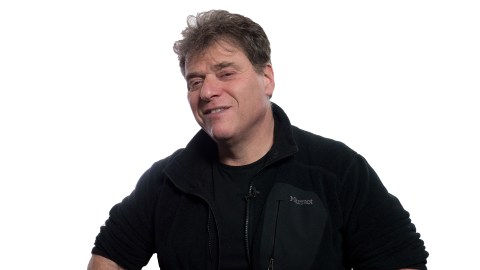Andrew Keen: Uber is an Example of Why the Internet is Not the Answer

After decades spent as a Silicon Valley entrepreneur, Andrew Keen has dedicated the past several years to career critiquing technology’s negative effects on society. His latest book, The Internet is Not the Answer, examines the ways in which businessmen have taken advantage of the unregulated internet in order to undermine its own supposed values. As an example, Keen tackles the car-sharing service Uber in today’s featured Big Think interview:
Keen begins with a bombastic indictment of Uber’s business philosophy:
“Uber’s [founder and CEO] Travis Kalanick epitomizes the frat boy libertarian approach in Silicon Valley. He has no respect for government, no respect for his employees, no respect for critical journalists who go after his company.”
To Keen, Kalanick represents a new wave of internet entrepreneurs who exploit the openness of the internet in order to take control of existing industries. While some would call this sort of disruption a good thing, Keen explains that Uber’s approach has been in no way beneficial to the market:
“Uber epitomizes the reason why the Internet is not the answer. At the moment we have this free market ideology that says all you need are platforms, that the Uber platform for cabs will replace the old archaic monopolies of the twentieth century. But of course Uber represents a much more dangerous monopoly.”
There’s a reason the taxi industry is regulated, says Keen. And by skirting those regulations, Uber is setting itself up as the dangerous kingpin of a broken industry. As an example, Keen shares an anecdote that he feels describes one major problem with Uber:
“I was in Detroit a few months ago, got into the back of a cab, African American driver, had five cabs of his own, would have been one of those small businessmen who would be swept away by Uber. Hardworking guy, very anti-Uber. He told me a story. His brother-in-law got out of jail, done ten years for manslaughter. When he came out of jail I said to him, ‘What did he do? Come and work for you?’ He said, ‘No, I can’t employ him. The regulations are against me employing someone who’s done ten years for manslaughter.’ But that brother-in-law got a job with Uber. There’s no checks on Uber drivers so when you get into the back of an Uber cab you can be attacked.”
There are some who consider Andrew Keen the conscience of internet culture. Few tech aficionados approve of the idea that Silicon Valley internet innovations need to be sharply regulated. But Keen argues that it’s unwise to blindly trust companies like Uber:
“So all this free market libertarian ideology, this idea that the government is the enemy, that regulation is the enemy is lending itself to a system whereby Uber isn’t regulated, isn’t controlled, can charge us anything they want, can exploit us as customers.”





